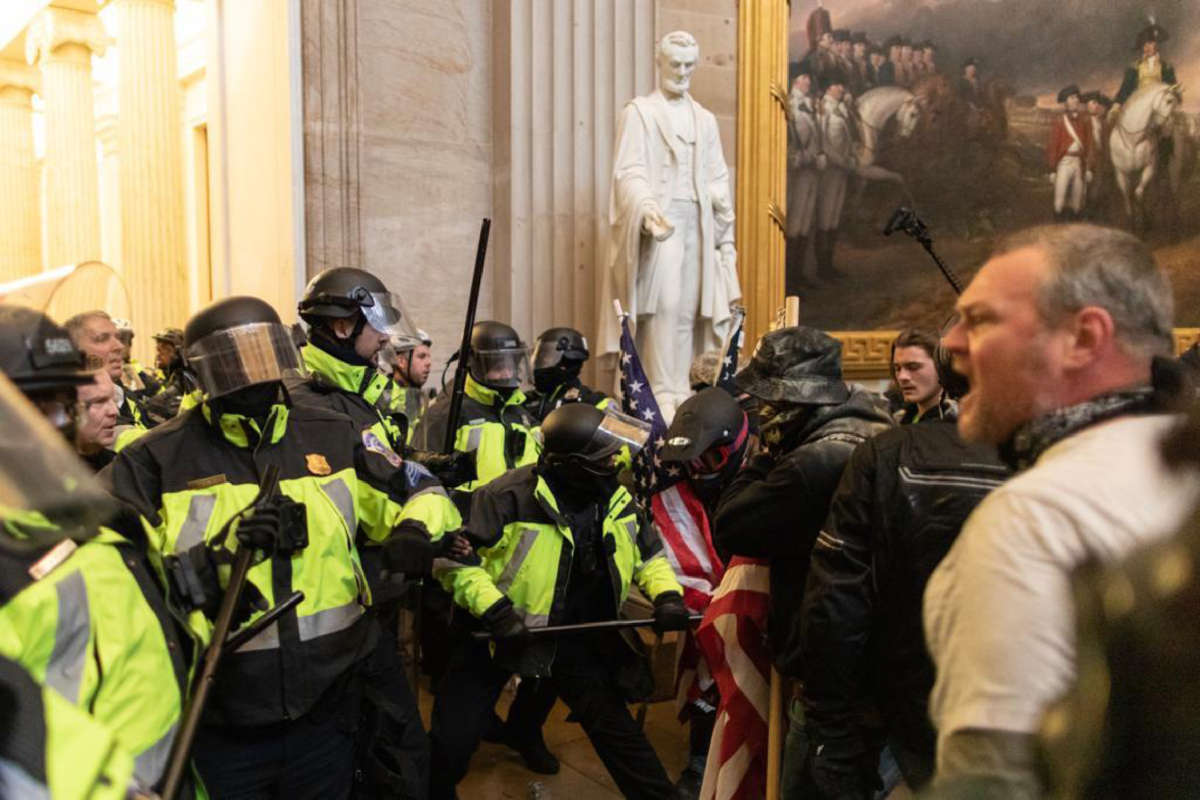Several campaign committees dedicated to electing Democrats have indicated that they will highlight the GOP’s consistent downplaying of the January 6 Capitol attack as part of their midterm election strategy — putting particular emphasis on language that was used by GOP leaders in the censure of Republican Reps. Adam Kinzinger (R-Illinois) and Liz Cheney (R-Wyoming).
In that document, the Republican National Committee (RNC) rebuked Kinzinger and Cheney for working with the House select committee investigating the Capitol attack, describing the events of January 6, 2021, when a mob of Trump loyalists violently interrupted the certification of the 2020 presidential election, as “legitimate political discourse.”
Ever since the censure resolution was voted on and approved by members of the RNC, Republicans have been scrambling to distance themselves from it. Senate Minority Leader Mitch McConnell (R-Kentucky), for instance, blasted the censure motion’s language, noting that the attack on the Capitol was “a violent insurrection for the purpose of trying to prevent a peaceful transfer of power.”
Sen. Susan Collins (R-Maine) also spoke out against the document, saying that it would disadvantage Republicans in the upcoming elections this fall. “Every moment that is spent re-litigating a lost election or defending those who have been convicted of criminal behavior moves us further away from the goal of victory this fall,” Collins said.
Several Democratic Party campaign committees and Political Action Committees (PACs) recently told Axios that they won’t let voters forget about the RNC’s characterization of the Capitol breach as “legitimate political discourse.”
“We will ensure that they are held accountable for a position completely at odds with the American people,” House Majority PAC executive director Abby Curran said.
“[We will] continue to remind voters throughout the year that the official position of the Republican Party is that attacking the Capitol … and trying to overturn an election are ‘legitimate political discourse,'” an aide to the Democratic National Committee said.
Rep. Sean Patrick Maloney (D-New York), chair of the Democratic Congressional Campaign Committee, suggested that the topic will be at the forefront of the midterm races.
“The Republican Party is having a hard time deciding whether a violent attack on the Capitol is good or bad. We think they should have to answer for that,” Maloney said.
Meanwhile, Democratic candidates in swing districts have indicated that they will make the language of the censure resolution a central issue in the upcoming midterms.
“I will challenge an opponent to discuss it. Do they think that was ‘legitimate political discourse’?” Rep. Susan Wild (D-Pennsylvania) said to Axios.
An ABC News/Ipsos poll published in early January found that 72 percent of Americans believe that the attack on the Capitol building last year was a threat to U.S. democracy.
But while some Republicans try to distance themselves from the issue, making statements that reject the language of the RNC censure, this may ultimately be to their detriment: a majority of the poll’s Republican respondents (52 percent) opposed the view of American voters overall, saying that the individuals involved in the attack were “protecting democracy.” This means that in trying to appeal to mainstream voters, GOP candidates may alienate their own base of supporters, lessening their chances of electoral wins.
Typically, the party of the newly elected president fares poorly in the first midterm races after the president assumes office — and with Democrats controlling both houses of Congress by only a slim margin, Republicans are hoping that historical trends from the past half-century will remain true in this year’s midterms.
Highlighting the GOP’s role in the events of January 6 will likely work to Democrats’ advantage — as will emphasizing Republican candidates’ ties to former President Donald Trump, whose favorability ratings in most polls are a net-negative in the double digits.
As of right now, most pundits are saying that Republicans will likely win the midterm races. But polling results are less clear. According to an Economist/YouGov poll published earlier this week, Democrats have a slight upper hand over Republicans, with 43 percent of voters saying they plan to vote for a Democratic candidate and 39 percent saying that they want a Republican to win in their home district.
Join us in defending the truth before it’s too late
The future of independent journalism is uncertain, and the consequences of losing it are too grave to ignore. To ensure Truthout remains safe, strong, and free, we need to raise $27,000 in the next 24 hours. Every dollar raised goes directly toward the costs of producing news you can trust.
Please give what you can — because by supporting us with a tax-deductible donation, you’re not just preserving a source of news, you’re helping to safeguard what’s left of our democracy.
